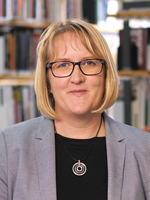Critics, Partners, Troublemakers?
Interview with Melanie Coni-Zimmer and Diane Schumann on International Dialogue Forums
Ursula Grünenwald: To start out, can you just outline the main idea of your research project in a few sentences?
Diane Schumann: Our research project examines dialogue forums of international economic institutions. Dialogue forums were established as a reaction to widespread criticism from various civil society actors. They were implemented by international and regional economic institutions, such as the WTO, the OECD and the G7, as a space to interact with civil society representatives. They are supposed to provide a space for direct exchange, where critical voices and outside perspectives can be discussed an included. Eventually, the idea behind the forums was to restore the legitimacy of international economic institutions.
While the idea of dialogue forums was first praised to be a step to make international institutions more transparent and democratic, they are also being strongly criticised. Our research therefore examines the design and practice of different economic institutions over time and in comparison. We are particularly interested in the deliberative qualities of different dialogue forums, this means that we examine whether they are easily accessible, allow for an open and transparent dialogue of diverse voices and actual exchange with institutional representatives.
Ursula Grünenwald: In 2022, you participated in dialogue forums of several international institutions in Washington, Geneva and Bali. What are similarities and differences between these forums?
Melanie Coni-Zimmer It was really exiting to participate in these events. Due to the Corona pandemic, we could only attend virtual meetings before that. I attended the Public Forum of the WTO in Geneva in September and the Civil Society Policy Forum organized by the World Bank and the IMF in Washington, DC in October.
It is common to both forums that civil society actors can propose and organize thematic sessions where issues of concern are discussed. A major difference is that the WTO Public Forum invites a broader range of stakeholders including not only civil society but also academics, corporate representatives and individuals. The CSPF is narrower in that only representatives from civil society organizations are invited. During high-level events and thematic sessions, civil society representatives shared their concerns and criticism around global economic governance and concerning specific issues related to the international organizations. Some civil society organizations share specialized expertise, others are from affected communities or try to bring in the voice of those affected. Topics discussed range from climate change, responses to the Covid-19 pandemic to the impact of the Ukraine war and reform agendas for both organizations.
A major difference is that the Civil Society Policy Forum takes place coinciding with the Spring and Annual Meetings of the World Bank and the IMF. It’s really busy at that time because ministers and diplomatic delegations from all member states attend these meetings of the World Bank and IMF.
“We are particularly interested in the deliberative qualities of different dialogue forums, this means that we examine whether they […], allow for an open and transparent dialogue of diverse voices […].” (Diane Schumann)
Diane Schumann: I attended the Civil 20 Summit in Bali in October. The Civil 20, or C20, are one of the various Engagement Groups of the G20. The processes here are very different when compared with the dialogue forums of the World Bank/IMF and WTO. The G20 is not a formal organisation but rather a forum in itself, it does not have staff or a secretariat. Instead, it is organised via a rotating presidency by the different G20 member countries. These characteristics also heavily impact the process of the Engagement Groups.
For the C20, this means that the process is organised primarily by civil society, and not by G20 representatives. The group is also formed new every year – corresponding with the G20 presidency. So, in 2022, with Indonesia being the G20 host country, C20 organisation was in the hands of an Indonesian civil society organisation, in 2021, when Italy hosted the G20, Italian civil society was mainly responsible for the organisation of the C20. Consequently, stability and consistency of the C20 are somewhat limited, learning processes are slow and relations to the G20 host country have to be negotiated every year. The topics discussed within the C20 are quite broad and tend to rely on the G20 agenda. They range, among others, from climate change and human rights to education and anti-corruption.
Ursula Grünenwald: How did the Covid-19 pandemic impact your research project and the exchange between international institutions and civil society actors
Melanie Coni-Zimmer Our project started in March 2020, more or less at the same time when Corona was declared a global pandemic. As a consequence, most dialogue forums – that had been conducted as in-person events for many years – were first cancelled and then reinvented as virtual meetings in 2021. Originally, participating in these in-person meetings was an important corner stone of our research project to better understand how these forums work and to get in touch with civil society representatives participating. Instead of attending these meetings in-person, we could only observe online meetings. This year, many organizations returned to in-person meetings or organized hybrid formats.
Diane Schumann: At the same time, having more online events allowed for a broader, or easier inclusion of different civil society actors. Travel costs and visa issues can make it difficult to attend these forums, especially for smaller organisations or those from the Global South. Holding meetings online or in a hybrid form eliminates some of these barriers and can make consultations or meetings more feasible.
“[…] we are focussing on the conditions that could enable a successful or serious dialogue and we are then comparing this to the dialogue forums’ reality.” (Diane Schumann)
Ursula Grünenwald: How do you determine whether an offer of dialogue is serious or whether it's just a way to defuse criticism?
Diane Schumann: This is one of the core questions of our project. To be able to find answers to this, we are focussing on the conditions that could enable a successful or serious dialogue and we are then comparing this to the dialogue forums’ reality.
For example, we are closely examining the dialogue forums’ application processes, attendance by institutional representatives and their potential influence. Regarding access to the forums, an open dialogue would require a relatively simple process that is open for a variety of voices and perspectives. An opaque selection process on the other hand could mean that institutions are actively looking to weed out more critical participants.
Ideally, representatives of the respective institution should also actually attend the forum to facilitate direct exchange. At the Civil 20 Summit in Bali in October 2022 for example, presence of any G20 representatives was severely limited. Civil society participants understood this as a lack of interest in their work and effort. For the third point, the potential of having tangible influence in the respective institution, we are interested in existing pathways and institutional characteristics that would allow for – or prohibit – influence.
Overall, we are seeing tendencies, that institutions use dialogue forums to monitor criticism and civil society activities, but are not willing to drastically change their own practices or allow for influence on their decision-making processes.
Ursula Grünenwald: Are critics perceived as troublemakers or important partners who help to overcome current challenges? Has anything changed in this regard in recent years?
Melanie Coni-Zimmer: I think it is not an either/or question. First, I think it is noteworthy that today, we often don’t see large-scale protests against international economic organizations such as those by the alter-globalization movement around the millennium. Think of Prague in 2000 or Genoa 2001. Today, we see different forms of protest and criticism.
Second, what has really changed is that most international organizations have opened up and established some form of access for civil society organizations. Some offer formal consultative status to non-governmental organizations, others organize consultative processes and still others organize dialogue forums that we focus on. Civil society organizations have become important partners for many international organizations in the sense that they provide important expertise, they seek to represent voices of those affected by decisions of international organizations, they propose policy reforms or help with the implementation of policies and programs.
At the same time, not all civil society actors are interested in cooperating with international organizations and might chose some form of protest. These actors might be perceived as troublemakers but I think that they also have an important role in global governance because they often publicly highlight grievances and issues that need to be addressed urgently.
“Even if they have important criticism and propose reforms, they are well aware that current global problems […] require international cooperation.” (Melanie Coni-Zimmer)
Ursula Grünenwald: Multilateral organizations are in crisis currently. Individual states are withdrawing. What role do civil society movements play here? Do they deepen the breakaway tendency or advocate for international cooperation?
Melanie Coni-Zimmer: Civil society is a broad frame and you would probably find examples for both tendencies. Think of populist movements in many countries around the globe. But those civil society organizations that we look at, those participating in dialogue forums of international organizations, are rather advocates for international cooperation. Even if they have important criticism and propose reforms, they are well aware that current global problems cannot be solved by individual states but require international cooperation.
For example, during the WTO Public Forum, there was indeed a strong sense that the organization is in crisis, that it needs to prove its continued relevance in the face of the current polycrisis including tackling the political and economic consequences of the Covid-19 pandemic and the Ukraine war. Civil society makes important contributions in these discussions including proposing reforms to organizations.
Diane Schumann: Additionally, civil society can play an important role in communicating with broader public about the importance of continued international cooperation. Practices and processes especially within global economic governance often remain opaque and difficult to understand. Civil society involvement cannot only contribute to making these processes more inclusive but also to making these more transparent by relaying and translating them to the general public.
Ursula Grünenwald: Thank you very much for the conversation!
Melanie Coni-Zimmermann is a Senior Researcher at PRIF.
Diane Schumann is a Doctoral Researcher at PRIF.
A conversation with

Project Leader and Senior Researcher

Doctoral Researcher